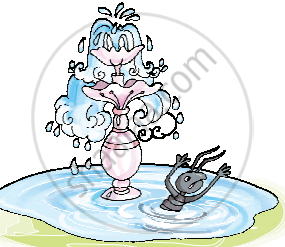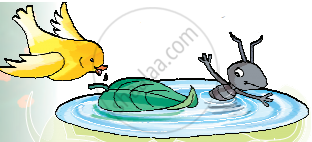Advertisements
Advertisements
प्रश्न
Listen to the following paragraph.
|
The Ant and the Dove On his way home, an ant saw a sparkling fountain. He crawled onto its wall to take a closer look.
Suddenly he slipped and fell into the water. He gurgled and panicked and waved his legs in the air. “Help! I can't swim,” he cried. Luckily, just at that moment, a friendly dove flew by. She saw that the tiny ant was drowning and quickly flew to a nearby tree. She pulled off a leaf and let it glide down to the ant. “Here you are,” she cooed and flew away.
(Adapted from Aesop’s Fables) |
- Why do you think the dove helped the ant?
- How do you think the ant felt on finding the leaf?
- Have you ever been in trouble like the ant? Did anyone help you?
उत्तर
- I think the dove helped the ant because she was friendly by nature and so took pity on the tiny ant.
- On finding the leaf the ant would have felt very happy. She would have also felt thankful to the dove.
- Once I got lost in a fair. I got panicked. I requested several persons, to give me their mobile for a while so that I may call to my father. But no one helped me. In the last I went to a policeman and gave him my father’s mobile number. The policeman contacted with my father and told him to pick me up from the main gate of the compound where the fair was held.
APPEARS IN
संबंधित प्रश्न
Complete the table with suitable responses.
| Sr.No. | CAUSE | ACTION | EFFECT |
| 1. | Krishna Deva Raya wants all the best things in the world. | He pays 1000 gold coins for the red peacock. | |
| 2. | Chatur Pandit is greedy and wants to get rich. | The king banishes him from the court for a month. | |
| 3. | He hires a painter and paints four peacocks red. | He proves that the king spends money needlessly. |
Why did Chatur Pandit ask the king for 1000 gold coins?
A close family bond is like a ______.
You must check on the __________ and __________ for the train of your choice.
Your personal details like __________ and __________ are a must.
Santhiya always talks on her mobile to her friends.
When was she cycling?
What else was stolen from the apartment?
Do you like mysteries? What is your favorite kind of story? Explain.
Shorter bird vocalizations are ______.
One pound is equal to______.
Who is lucky?
Choose the correct one after listening the movie clip.
How many times did Bart say that the can opener is broken?
Chennai is the fourth largest city in India to receive more rain.
Listen to the audio and choose true or false.
It absorbs the pressure.
Listen to the audio and choose true or false.
It is a breakable pencil.
Where is Manipur on the map of India?
Read the following statements. Now, listen to the talk on the importance of humour and laughter for good physical and mental health. You may listen to the text again if required, to help you choose the correct option
Humour and laughter are used in a variety of therapeutic situations. Therapeutic humour has the power to motivate and lessen stress and pain. Laughter improves one’s sense of well being. The benefits of a good “belly laugh” are being discovered by empirical research. You can feel relaxed and good after laughing at a funny movie, television program, or humorous event.
It seems generally accepted that our bodies respond in a positive way to a hearty laugh. It is reported that laughter, like exercise, can reduce stress, improve tolerance to pain, and alter bodily functions such as blood pressure, heart rate, muscle activity, and stomach acidity. In business, managers are learning the advantages of using humour. Happier, healthier employees work better. Humour improves employee creativity, so employees are sometimes trained how to introduce humour into their personal/professional life.
A number of hospitals and related institutions have created humour rooms. The humour room is stocked with books, comics, funny posters, audiotapes, and videos. Humour is a therapeutic tool that demands energy for its creation, yet its rich rewards include a closer therapeutic bond through shared laughter. The best humour comes from what is going on “at the moment.” Therefore one can plan to use humour yet rely on spontaneous opportunities to employ it. Humour is something positive that should bring mutually shared enjoyment and pleasure. Above all, humour is called a way of living not a part of living.
i) Humour has the power to motivate and ______stress and pain.
- improve
- intensify
- intensify
- increase
ii) It seems generally ______that our bodies respond in a positive way to a hearty laugh.
- accepted
- denied
- improved
- confused
iii) The _________ is stocked with books, comics, funny posters, audiotapes, and videos.
- waiting room
- humour room
- ICU
- reception
iv) One can plan to use humour yet rely on __________ opportunities to employ it.
- late
- better
- future
- spontaneous
v) Humour is called a way of _________, not a part of living.
- living
- playing
- nourishing
- developing
Listen to the poem and fill in the blanks with appropriate words and phrases. If required, listen to the poem again
Wander-thirst
BEYOND the East the sunrise, beyond the West the sea, And East and West the wander-thirst that will not let me be; It works in me like madness, dear, to bid me say good-bye; For the seas call, and the stars call, and oh! the call of the sky!
I know not where the white road runs, nor what the blue hills are; But a man can have the sun for a friend, and for his guide a star; And there’s no end of voyaging when once the voice is heard, For the rivers call, and the roads call, and oh! the call of the bird!
Yonder the long horizon lies, and there by night and day The old ships draw to home again, the young ships sail away; And come I may, but go I must, and, if men ask you why, You may put the blame on the stars and the sun and the white road and the sky.
Choose the best option and complete the sentences.
1. ______ works like madness in the poet.
- Wander – Thirst
- Bidding Farewell
- Eastern Sunrise
- Western Seas
2. A man could choose ______ as his guide.
- the sun
- the hills
- a star
- a bird
3. There is no end of ______once the voice is heard.
- walking
- roaming
- talking
- voyaging
4. The old ships return, while the young ships ______.
- drift
- move
- sail
- wander
5. The blame is on the sun, stars, the road and the ______.
- hills
- trees
- seas
- sky
Which of the following is not considered a tool for formative assessment?


